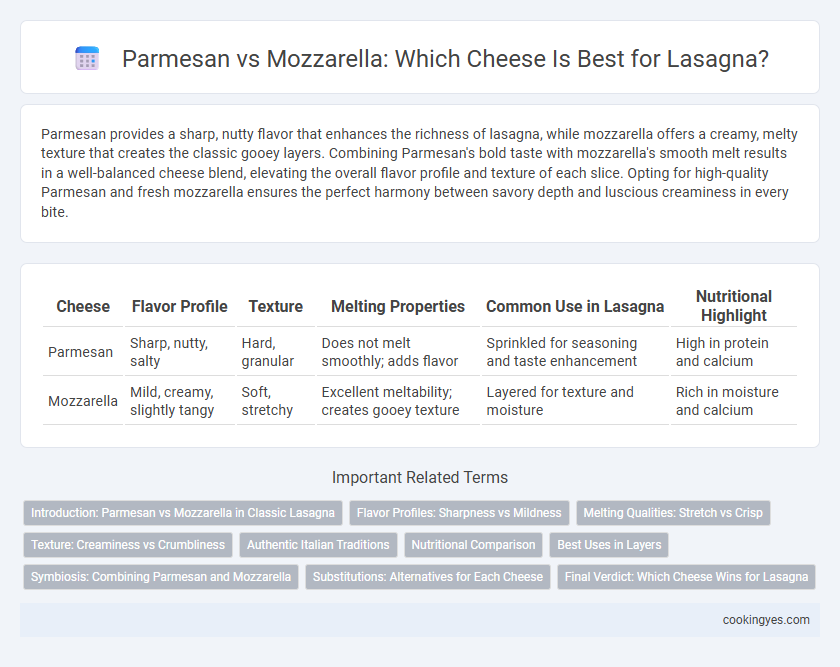Parmesan provides a sharp, nutty flavor that enhances the richness of lasagna, while mozzarella offers a creamy, melty texture that creates the classic gooey layers. Combining Parmesan's bold taste with mozzarella's smooth melt results in a well-balanced cheese blend, elevating the overall flavor profile and texture of each slice. Opting for high-quality Parmesan and fresh mozzarella ensures the perfect harmony between savory depth and luscious creaminess in every bite.
Table of Comparison
| Cheese | Flavor Profile | Texture | Melting Properties | Common Use in Lasagna | Nutritional Highlight |
|---|---|---|---|---|---|
| Parmesan | Sharp, nutty, salty | Hard, granular | Does not melt smoothly; adds flavor | Sprinkled for seasoning and taste enhancement | High in protein and calcium |
| Mozzarella | Mild, creamy, slightly tangy | Soft, stretchy | Excellent meltability; creates gooey texture | Layered for texture and moisture | Rich in moisture and calcium |
Introduction: Parmesan vs Mozzarella in Classic Lasagna
Parmesan and mozzarella serve distinct roles in classic lasagna, with Parmesan providing a sharp, nutty flavor and a granular texture that enhances savory depth, while mozzarella offers a creamy, melty consistency that contributes to the dish's rich, gooey layers. Parmesan's robust taste complements the tomato sauce and meat, balancing the overall flavor profile, whereas mozzarella's mildness and excellent melting properties create the signature cheesy stretch and moisture. Combining both cheeses achieves a harmonious balance, delivering a traditional lasagna experience celebrated for its complex texture and rich taste.
Flavor Profiles: Sharpness vs Mildness
Parmesan cheese offers a sharp, nutty flavor that enhances the savory depth of lasagna, providing a bold, salty kick that contrasts well with rich tomato sauce. Mozzarella delivers a mild, creamy texture with a subtle sweetness, creating a smooth, melty layer that balances the dish's acidity and adds a delicate richness. Combining Parmesan's intense sharpness with Mozzarella's mellow mildness results in a harmonious flavor profile that elevates traditional lasagna.
Melting Qualities: Stretch vs Crisp
Mozzarella cheese is prized in lasagna for its excellent melting qualities, creating a stretchy, gooey texture that enhances each bite with a creamy consistency. Parmesan, on the other hand, offers a drier, crisper finish when baked, adding a savory, slightly gritty contrast that helps to form a flavorful, golden crust. Combining both cheeses balances the stretchiness of mozzarella with the crisp, umami-rich edges from Parmesan, delivering a perfect harmony of textures and tastes in lasagna.
Texture: Creaminess vs Crumbliness
Mozzarella cheese provides a creamy, melty texture that creates a smooth, gooey layer in lasagna, enhancing its rich mouthfeel. Parmesan cheese contributes a crumbly texture with a slightly granular bite, adding a savory depth and sharpness that balances the dish. Combining both cheeses achieves an ideal contrast, blending mozzarella's creamy stretch with parmesan's crumbly complexity for a harmonious texture.
Authentic Italian Traditions
Authentic Italian lasagna traditionally incorporates both Parmesan and Mozzarella cheeses, but Parmesan is often preferred for its sharp, nutty flavor that enhances the meat and bechamel sauce layers. Mozzarella contributes a gooey, meltable texture, creating the classic creamy consistency essential in Italian cuisine. The balance of aged Parmesan and fresh Mozzarella achieves the rich taste and texture characteristic of traditional Italian lasagna recipes.
Nutritional Comparison
Parmesan cheese contains higher protein levels and less moisture than mozzarella, contributing to a richer umami flavor and firmer texture in lasagna. Mozzarella offers more calcium and lower fat content, which enhances meltability and a creamy mouthfeel while being a lighter option. Choosing between Parmesan and mozzarella impacts both the nutritional profile and taste experience of lasagna, balancing richness with meltability and calcium intake.
Best Uses in Layers
Mozzarella cheese is ideal for the middle layers of lasagna, providing a creamy, melty texture that enhances the overall dish's moisture and stretchiness. Parmesan excels as a topping or mixed into the cheese layers to add a sharp, salty flavor and contribute to a golden, crispy crust when baked. Using both cheeses strategically in layers delivers a balanced combination of melty richness from mozzarella and savory depth from Parmesan.
Symbiosis: Combining Parmesan and Mozzarella
Parmesan and mozzarella create a perfect symbiosis in lasagna by balancing sharp, nutty flavors with creamy, melty textures. Parmesan's rich umami enhances the sauce complexity, while mozzarella provides gooey stretch and moisture retention. Combining these cheeses ensures a layered taste and ideal mouthfeel that defines classic lasagna.
Substitutions: Alternatives for Each Cheese
Parmesan can be substituted with Asiago or Pecorino Romano to maintain a sharp, nutty flavor in lasagna, while mozzarella alternatives like provolone or fontina offer similar meltability and creamy texture. For a dairy-free option, nutritional yeast provides a cheesy flavor akin to Parmesan, and vegan mozzarella made from cashews or coconut oil mimics the stretch and moisture of traditional mozzarella. These substitutes ensure that lasagna retains its rich, layered taste and satisfying mouthfeel without compromising dietary preferences or ingredient availability.
Final Verdict: Which Cheese Wins for Lasagna
Parmesan cheese delivers a sharp, nutty flavor that enhances the overall savory depth of lasagna, while mozzarella provides a creamy, melty texture that creates the classic gooey layers. Combining both cheeses offers a balance of taste and texture, but if choosing one, mozzarella often wins for its essential role in producing the signature stretch and richness characteristic of traditional lasagna. Parmesan is best used as a topping or mixed in for flavor complexity, but mozzarella remains the primary cheese for the ultimate lasagna experience.
Parmesan vs Mozzarella for Lasagna Cheese Infographic

 cookingyes.com
cookingyes.com